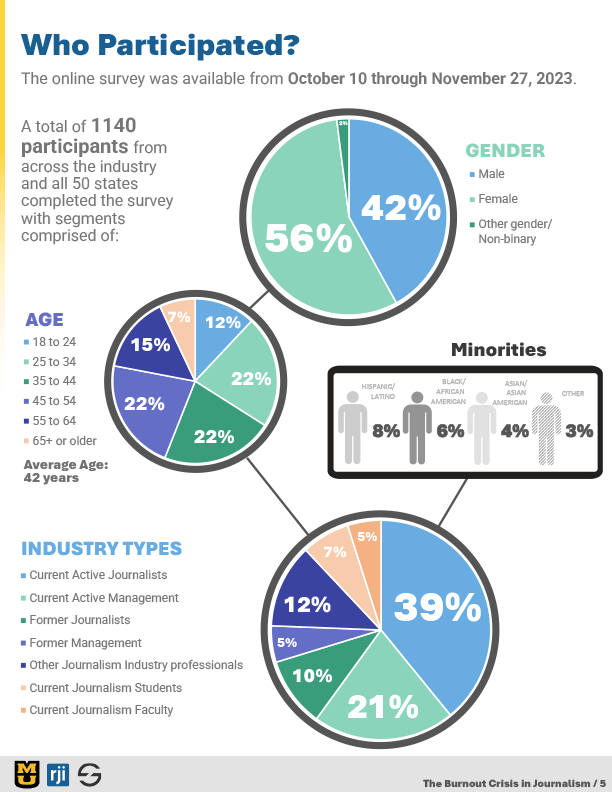Addressing burnout in journalism means flexible shifts, more supportive culture — results of large-scale survey from RJI and SmithGeiger
The Reynolds Journalism Institute (RJI) at the Missouri School of Journalism, in partnership with research firm SmithGeiger, today released the results of one of the largest surveys ever conducted on burnout in the journalism industry. A white paper, based on responses from 1,140 active and former journalists, is available here, and the data is available to researchers nationwide who can contact rji@rjionline.org to learn more.
“Honest, direct feedback about what it’s like to work in journalism translates to solutions that are grounded in reality,” said Randy Picht, executive director of RJI. “That’s the only way to move the needle, and that’s exactly what we got from this survey.”
Amid widespread pessimism (44% of respondents were pessimistic about the state of the industry, rising to 56% in southern regions), the vast majority of respondents agreed that greater flexibility in scheduling and work-from-home options are needed.
While some options, like a four-day work week (supported by 90% of current journalists and newsroom managers surveyed), might be more challenging for news organizations facing financial and staffing squeezes, others — like hybrid shifts that allow employees to complete their work from a combination of in-office and at-home work, or flexible scheduling that is more accommodating of life outside of work — could be implemented more easily.
“In a media landscape marked by uncertainty, SmithGeiger researchers wanted to explore viable journalism burnout solutions that balance professional and personal success,” said Andrew Finlayson, executive vice president of digital media strategies at SmithGeiger. “Journalism cannot thrive unless journalists can keep the passion for their important work.”
Honest, direct feedback about what it’s like to work in journalism translates to solutions that are grounded in reality. That’s the only way to move the needle, and that’s exactly what we got from this survey.
Randy Picht
To that end, the results offered plenty of reason to believe journalists are willing to stick around if they feel heard. 91% of current professionals agreed with the statement, “I love what I do,” indicating that concerns about workplace culture (46% of former journalists and managers cited a need for improvements like ensuring people feel appreciated for their work) and flexibility need not override the passion journalists feel for their work.
At the same time, a striking 49% of respondents agreed journalism has become a dangerous profession, a number researchers believe potentially speaks to the pervasiveness of social media harassment and the broader negative impacts of a distrustful, politically polarized public. Efforts like RJI Fellow Jennifer Mizgata’s training resources to help newsrooms build more positive cultures, as well as an increasingly common move toward trauma-informed reporting, could help alleviate both direct and indirect stessors and traumas faced by people throughout the industry.
Building on the results, RJI and SmithGeiger plan to work with newsrooms all over the country to turn the research into real action through workshops, seminars and partnerships designed to tackle burnout head-on.
Joy Jenkins, an assistant professor at the Missouri School of Journalism and a veteran editor, said the survey showed that employees aren’t keen to let the workplace flexibility that blossomed during the COVID-19 pandemic wither away.
“There are expectations of flexibility now, and there need to be continuing conversations about how to make that happen,” said Jenkins, who was not involved in the research. “People who are caregivers, for example, or have other things taking up their time — they want to stay in journalism but may not see that as an option right now.”
Flexible shifts and support for work-life balance have long been shown to effectively reduce stress, support equity and increase productivity despite common assumptions that these are costly, burdensome measures.
There are expectations of flexibility now, and there need to be continuing conversations about how to make that happen. People who are caregivers, for example — they want to stay in journalism but may not see that as an option right now.
Joy Jenkins
“When you offer flexibility to employees, you demonstrate that you trust them,” said Nick Mathews, who, like Jenkins, is an assistant professor at the School of Journalism and was not involved in the research.
Mathews connected the results to his prior experiences as a sports editor.
“The line I would always use with my journalists was when I saw them in the newsroom, they weren’t doing their jobs. They needed to be out in the community to tell the stories of that community. When a news organization says you have to come back into the office for the final three hours of the day, it sends the message that the boss doesn’t trust you to do your job.”
For Jenkins, the results mean there is work to be done not only in the newsroom, but in the classroom.
“As this generation heads into the newsroom, they are going to have some clear expectations about being able to express their concerns in ways that feel meaningful,” Jenkins said. “If we want to not only retain the journalists we have but create spaces new people want to work in, then they have to feel seen and heard. There are helpful insights from this survey that faculty can use in terms of, ‘here’s what we’re seeing on the ground right now. How does this make you feel?’”
To learn more about these efforts and other RJI programs and research, sign up for the free RJI Weekend Newsletter and explore rjionline.org.
Cite this article
Fitzgerald, Austin (2024, February 29). Addressing burnout in journalism means flexible shifts, more supportive culture — results of large-scale survey from RJI and SmithGeiger. Retrieved from: https://rjionline.org/news/addressing-burnout-in-journalism-means-flexible-shifts-more-supportive-culture-results-of-large-scale-survey-from-rji-and-smithgeiger/


Comments